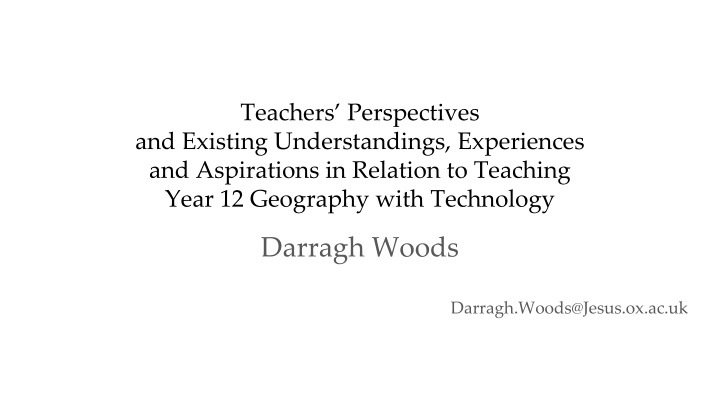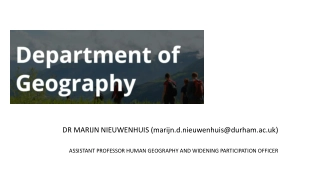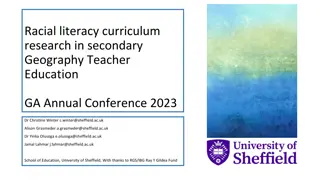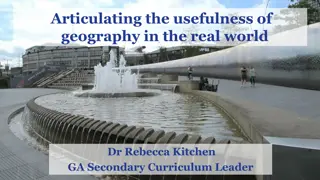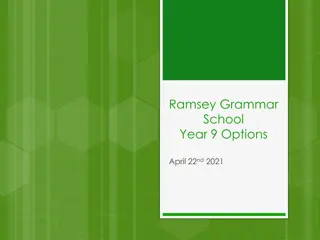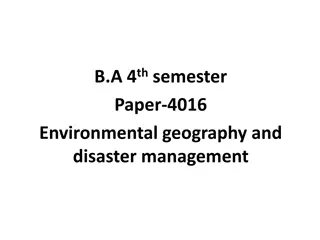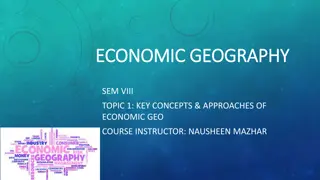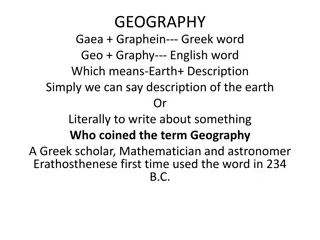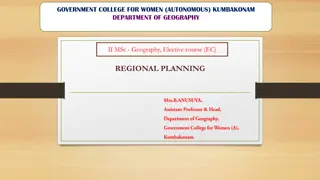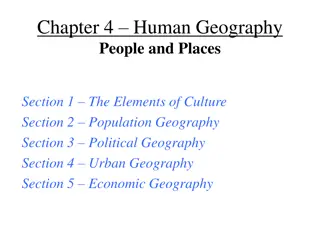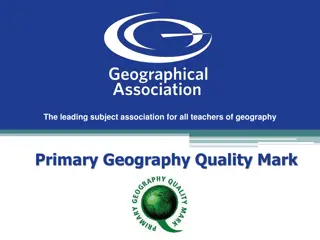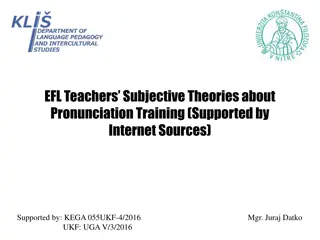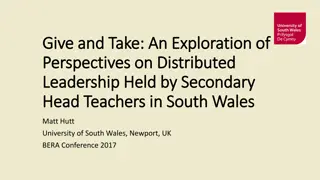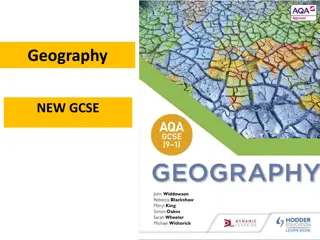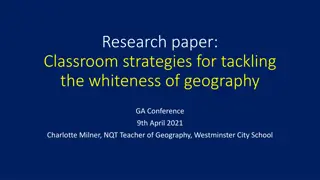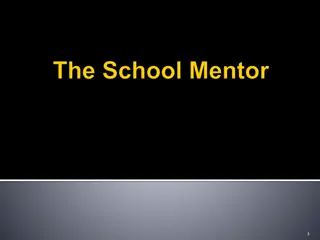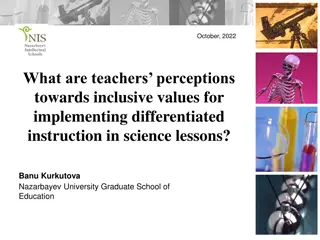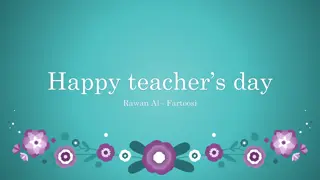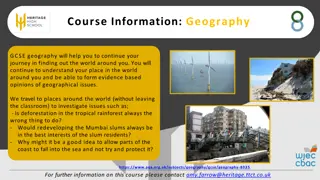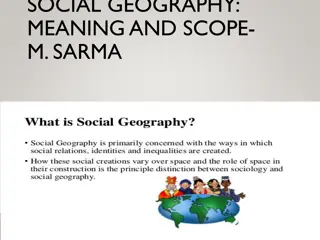Teachers' Perspectives on Technology in Year 12 Geography
Teachers' perspectives, experiences, and aspirations in utilizing technology for teaching Year 12 Geography are explored in this study. The research investigates current practices, relationships with technology, and future development possibilities.
Download Presentation

Please find below an Image/Link to download the presentation.
The content on the website is provided AS IS for your information and personal use only. It may not be sold, licensed, or shared on other websites without obtaining consent from the author.If you encounter any issues during the download, it is possible that the publisher has removed the file from their server.
You are allowed to download the files provided on this website for personal or commercial use, subject to the condition that they are used lawfully. All files are the property of their respective owners.
The content on the website is provided AS IS for your information and personal use only. It may not be sold, licensed, or shared on other websites without obtaining consent from the author.
E N D
Presentation Transcript
Teachers Perspectives and Existing Understandings, Experiences and Aspirations in Relation to Teaching Year 12 Geography with Technology Darragh Woods Darragh.Woods@Jesus.ox.ac.uk
Teaching Year 12 Geography Teachers Perspectives and Existing Understandings, Experiences and Aspirations in Relation to Teaching Year 12 Geography with Technology with technology
Teacher of Geography BSc Me PGCE MSc in Learning & Teaching
RQ1. How is technology used by teachers in Year 12 geography? RQ2. What types of relationships do geography teachers develop with technology? Research questions RQ3. How could technology usage in Year 12 geography be developed in the future?
Literature Review Methodology Findings & Discussion Conclusions
1. Literature Review 1. 2. Geographies through the digital : examples include GIS and online research Geographies produced by the digital : examples include the internet and administration software Geographies of the digital : examples include research into the body and video games and movements of big data and code Conceptualisation of Geography's 'Digital Turn'. Source: adapted from Ash et al. (2018). 3.
1. Literature Review a) What is technology? Technology concerns itself with understanding how knowledge is creatively applied to organised tasks involving people and machines to achieve objectives Lane s (2019, p.1) technology as network effect Oliver (2016, p.50) Gourlay (2012, p.198) argues that lecturers and students present as hybridised cyborg subjects because they interact both in digital and physical space Geography education is becoming more digital onscreen testing - AQA and Edexcel social media (Fearnley, 2021), with virtual reality (VR) has been used to successfully complement in-person field trips (Kitchen, 2021). wider variety of software allows teachers to acquire and develop knowledge too (Puttick, 2021).
1. Literature Review b) How has affect been attended to in the digital turn? Affect as what we understand as flows between bodies (Bazinet and Vilet, 2020, p.47) flows of emotion coalesce to form a social phenomenon (Tolia-Kelly and Crang, 2010, p.2309) Digital screens are a key point of contact between bodies (Sumartojo and Graves, 2021) Shaw and Warf (2009) explored this in the context of video games Implications for school geography First, affect resulting from the increasing accessibility of richly detailed data for scientific investigations Second, the school is a space which is saturated with data affective intensities that are co-constituted as part of digital-material everyday spatialities from physical activity (Sumartojo et al., 2016, p.40)
1. Literature Review c) How could technology use be developed? AI can revolutionise aspects of education namely assessment although it will not remove the role of the teacher (Cope et al., 2020) Ethical concerns given their power to complete tasks (Stahl et al., 2023) First investigations are beginning to appear in professional journals (see Griffiths, 2023) Increased use of GIS is one way technology use could be developed. GIS is important in geography teaching, but research on GIS in the classroom is somewhat limited (Healy, 2021). Technology could be developed to aid students understanding of geography. Whilst teachers must consider which sources of information to use carefully (Roberts, 2021), online resources are powerful. Puttick (2021) described how technology allows for the rapid sharing of information and allowed students to visually see the impacts of natural disasters in ways previously unimaginable Finally, fieldwork is one frontier that technology use could be developed within (see Goldup, 2013)
2. Methodology Ethical approval for teachers & students who were aged 16 or older At the time, I taught Year 12 but not Year 13 Focus on teachers, via interview Pupil input via online questionnaire
2. Methodology Inclusion criteria Teachers Students Any full-time teacher of A-Level geography at School A or any full-time geography teacher who was likely to teach this subject in the next academic year, without significant additional responsibility Any current Year 12 geography Student n = 6 (of a possible 30) n = 5 (of a possible 6, excluding myself)
2. Methodology The interview 1. 2. 3. How do you use technology in lessons? How do you use technology in teaching? How do you use technology in organising yourself and your students? How do you feel about technology in school? What do you feel about using PowerPoint so much? What do you think about online mark books? How do you think technology use will develop in School A? How could you use technology use for assessment? Why? What technology would you like to use more in teaching? Why? 10. What technology could help you in organising yourself and your students? Semi-structured Exploratory 4. 5. 6. 7. 8.30 am - 6.00 pm Under 45 minutes 8. 9. Mutually agreeable time Rescheduled
2. Methodology The interview UNESCO s (2022) ICT Competencies Framework for Teachers as a framework
2. Methodology The questionnaire Online 1. What technology do you use at and for school (and in particular, in Geography)? 2. How do you feel about using technology at and for school (and in particular, in Geography)? 3. How could technology use at and for school (and in particular, in Geography) be developed? Distributed via email to students Variety of longer answer and likert scale questions Current uses of technology, thoughts/feelings and future developments
2. Methodology Ethics - BERA (2018) Head teacher s assent Discussion with relevant Heads and HoDs Opt-in for teachers Parents and/or students could opt-out, then students voluntarily opted-in Time one interview, under 45 minutes, arranged at a mutually convenient time one survey, under 10 questions, large completion window Right to withdraw Hammond and Rawlings Smith (2023) and GDPR (DPA, 2018)
2. Methodology Data coded by reflexive thematic analysis, following Braun and Clarke (2006; 2022) >20,000 words of transcribed interviews 15-item checklist to guide analysis Thematic analysis led to code generation and thematic maps 18 categories, refined to 9 themes
3. Results & Discussion Chat GPT
3. Results & Discussion RQ1. How is technology used by teachers in Year 12 geography? Low-stakes assessment There s low stakes [uses]. Maybe we ve got a starter quiz, like a Blooket. Something like that. (Interview with Teacher C) Day-to-day teaching Some digital tool used in nearly every lesson Within any one lesson, technology could be used by students to complete research [during] independent work (Interview with Teacher B) Administration Communication - it s an email or it s a Teams message ... I can see it really quickly like a text message (Interview with Teacher E) Grade analysis
3. Results & Discussion RQ2. What types of relationships do geography teachers develop with technology? Stress The docks are great when they work, but they re not great when they don t work ; sync issues and the power cuts were infuriating, having to double mark the same piece of work (Interview with Teacher A) Generally, I think it does make my life easier until it goes wrong and then you go back to the old chalk-board style which we re not really trained for as much (Interview with Teacher D) Teaching in a power cut made me quite stressed (Interview with Teacher E)
3. Results & Discussion RQ2. What types of relationships do geography teachers develop with technology? Efficiency Dislike for the inefficiency of some technology auto-marked quizzes becoming really tricky and really tough to mark if students input answers that are spelt incorrectly (Interview with Teacher D) Amicable relationship with the efficiency of other technology I use PowerPoint for every lesson, even if it s for one slide. Just to even put it on the board rather than having to write out instructions saves so much time (Interview with Teacher B)
3. Results & Discussion RQ2. What types of relationships do geography teachers develop with technology? Productive relationships - scheduling technology & dataification I use the Outlook Calendar and I like how it can give you reminders in advance. So today has been a really busy day and lots of things to do, but I get a half-hour reminder (Interview with Teacher D). Most of the planning is through the PowerPoint structure rather than writing out a physical lesson planning form, it s all done in those comment sections. Or on the actual slides, timings and such (Interview with Teacher A).
3. Results & Discussion RQ3. How could technology usage in Year 12 geography be developed in the future? Assessments AI is going to become more and more evolved. There s gonna have to be a whole mindset change regarding what homework can be set outside of lessons. Coursework is going to have to be completely overhauled as a result of it . While Teacher C expressed concern at how ChatGPT is so sophisticated And I m not too familiar with it
3. Results & Discussion RQ3. How could technology usage in Year 12 geography be developed in the future? Pedagogy o Fieldwork GIS is being able to show numerical data spatially , which makes students engage with their fieldwork results and then use technology to produce graphs and things like that , although not all students know how to do it (Interview with Teacher E) spreadsheets can be useful for fieldwork to process and layout data (Student 6) o Visualising learning most of the time we re talking about a place whether it was physical or human geography . (Interview with Teacher C) technology could be developed to allow for immersive experiences of non-visited case studies, such as Singapore (Student 2) watch videos on what we are learning about (Student 3)
3. Results & Discussion RQ3. How could technology usage in Year 12 geography be developed in the future? Resistance It s more of a personal preference [of mine] to write things out technology doesn t have the same feeling of getting something done (Interview with Teacher E) Expressing concern for students Teacher D noted they don t have the personal and inter- personal skills that kids used to have because they re in technology all the time . (Interview) Concern about the developments with AI
4. Conclusions Technology is used by teachers of year 12 geography for assessment, day-to- day teaching and administration Teachers relationship with technology can be stressful, but also a productive one with increased efficiency Although there is some resistance to technology, assessment and pedagogy may stand to benefit from increased usage of digital tools Many future avenues AI?
Further reading Ash, J., Kitchin, R. and Leszczynski, A. (2018) Digital Turn, Digital Geographies? , Progress in Human Geography, 42(1), pp. 25-43. Braun, V. and Clarke, V. (2006) Using Thematic Analysis in Psychology , Qualitative Research Braun, V. and Clarke, V. (2022) Thematic Analysis: A Practical Guide. London: SAGE Publications Ltd. British Educational Research Association (BERA) (2018) Ethical Guidance for Educational Research. 4th edn. Available at: https://www.bera.ac.uk/wp-content/uploads/2018/06/BERA-Ethical-Guidelines-for-Educational-Research_4thEdn_2018.pdf (Accessed: 27 March 2024). Data Protection Act (DPA) (2018) Available at: https://www.legislation.gov.uk/ukpga/2018/12/contents/enacted (Accessed: 27 March 2024). Dodge, M. and Kitchin, R. (2005) Code and the Transduction of Space , Annals of the Association of American Geographers, 95(1), pp. 162-180. Hammond, L. and Rawlings Smith, E. (2023) Ethics, Data Protection and Research in Geography Education , Teaching Geography, 48(1), pp. 18-20. in Psychology, 3(2), pp. 77-101. Puttick, S. (2021) Digital Technologies and Their Roles in Knowledge Recontextualisation and Curriculum Making , in Walshe, N. and Healy, G. (eds.) Geography Education in the Digital World: Linking Theory and Practice. Abingdon: Routledge, pp. 17-25. Roberts, M. (2021) Geographical Sources in the Digital World: Disinformation, Representation and Reliability , in Walshe, N. and Healy, G. (eds.) Geography Education in the Digital World: Linking Theory and Practice. Abingdon: Routledge, pp. 52-64.
Teachers Perspectives and Existing Understandings, Experiences and Aspirations in Relation to Teaching Year 12 Geography with Technology Darragh Woods Darragh.Woods@Jesus.ox.ac.uk
